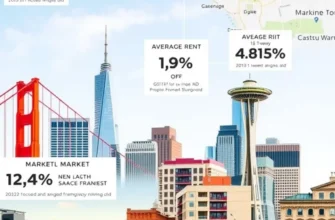Relocating to a new city can be an exhilarating experience, especially for young professionals, students, couples, families, and mobile workers eager to explore diverse opportunities. However, amid all the excitement, understanding city-specific utility costs can dramatically affect your budget and living comfort. These costs—ranging from electricity and water to gas and internet—can vary significantly based on geographic location, lifestyle choices, and even the time of year. Whether you’re targeting sunny Los Angeles, bustling New York City, or tech-savvy Austin, knowing the ins and outs of utility expenditures will empower you to make informed decisions about your new home. This guide breaks down the utility costs across major U.S. cities, offering practical insights and tips tailored to specific lifestyles, ensuring you have a seamless transition into your new community.
Understanding Utility Costs by City

When considering a move to a major U.S. city, understanding utility costs is crucial. Renters can face varied expenses depending on the region due to climate, infrastructure, and local legislation. Here’s what you can expect when it comes to utility costs in some key cities.
First, let’s define what utilities typically include for renters. Most often, these encompass electricity, water, gas, trash collection, and internet services. While some landlords might include certain utilities in the rent, others require tenants to cover these separately. Knowing what to expect in each location can aid in budgeting effectively.
New York City
In New York City, renters can anticipate higher electricity bills due to the city’s density and reliance on air conditioning during summer. An average electricity bill is around $105 per month. Water and trash services are typically included in rent, but internet costs average $62 monthly. The urban environment means less reliance on gas, with many apartments opting for electric heating systems.
Los Angeles
Los Angeles presents another scenario where electricity is a significant utility expense, averaging about $120 a month. The city’s warm climate reduces the need for heating but increases cooling costs. Water costs, although crucial due to drought concerns, average around $60. Internet services also hover near $70, reflecting the city’s demand for connectivity.
Chicago
In Chicago, the frigid winters significantly impact utility costs, with heating being a major expense. Natural gas costs can reach $80 monthly during the cold season. Electricity averages $95, with varied usage throughout the year. Water is often seen as an additional charge, given the wide range of housing types.
Houston
Houston’s sweltering summers make air conditioning a necessity, driving electricity costs up to an average of $140 monthly. Water and gas costs remain moderate, with gas used minimally due to the warm climate. However, the humid environment can demand higher water usage, increasing costs slightly compared to other regions.
Regional Variations
Climate significantly influences utility costs across cities. The northern cities like Chicago experience higher gas costs due to heating needs, while southern cities like Houston incur higher electricity expenses for cooling. Infrastructure and energy sources also play crucial roles. Cities relying heavily on renewable energy might see reduced costs or incentives, while older infrastructures might inflate expenses.
For renters keen on optimizing their budget, understanding these variations is critical. Moving to a city with efficient public utility services can offer substantial savings. Additionally, considering energy-efficient apartments or buildings with included utility costs can further alleviate financial stress.
To ensure you are not encountering unexpected adjustments in your utility costs, you may want to explore further insights into resolving rental billing errors. This resource provides invaluable strategies for maintaining accuracy in what you are billed.
Understanding the nuances of utility costs can transform your renting experience, helping you allocate your resources with greater precision and confidence. Whether you prioritize climate, infrastructure, or budget, knowing these can assist you in making the best decision for your lifestyle.
Budgeting Tips for Utility Management

When moving to a new city, managing utility expenses can be daunting. However, by implementing smart budgeting strategies, renters can effectively reduce costs and optimize usage. Assessing your average utility costs in advance is crucial. Research standard rates for electricity, water, and internet in your chosen city, as they vary widely. Check your lease for included utilities or average bills to expect.
Create a detailed budget by listing all your expected expenses, including rent and utility bills. Allocate a specific portion of your monthly income to cover these costs. Tools and apps can help track your spending, ensuring you remain within budget. Consider a “utilities envelope” – a dedicated bank account or fund for utility payments, promoting disciplined financial management.
Energy efficiency is another key to reducing costs. Simple adjustments, like unplugging devices when not in use or investing in energy-efficient bulbs, can significantly decrease your electricity bill. Regularly check HVAC filters to ensure systems operate efficiently. Incorporating smart technology, such as programmable thermostats, can aid in managing energy consumption effectively.
Water bills can be minimized through conscious usage. Fix leaks promptly, and opt for shorter showers. Using cold water for laundry and running full loads of dishes can also conserve water. If permitted, consider installing water-saving showerheads and faucet aerators.
Exploring assistance programs relevant to your area is beneficial. Many cities offer utility assistance programs to help lower-income renters manage their monthly costs. Check local government websites or utility company announcements for eligibility criteria and application processes.
Negotiating rates or bundling services can often lead to savings. Some utility providers offer discounts when you bundle services like internet and cable. Reach out to your service providers and inquire if such offers are available. Regularly compare provider rates to ensure you secure the best deals.
To further enhance your budgeting strategy for utility management, consider additional cost-saving measures featured in resources like this financial planning guide for renters. These insights can help you stay financially-savvy while navigating the expenses associated with your living arrangement.
Learning to manage utility costs through effective budgeting and smart usage can alleviate stress and prevent unforeseen financial strain. As renters in major U.S. cities adapt, they gain invaluable skills that pave the way for more responsible and sustainable living.
Final words
Understanding and planning for utility costs is essential for a smooth relocation experience. Each city presents unique challenges and opportunities, highlighting the importance of thorough research. By arming yourself with knowledge about average costs and budgeting strategies, you can confidently embrace the adventures that come with moving. This proactive approach not only enhances your financial stability but also enriches your overall living experience, enabling you to focus more on exploring your new surroundings and settling in. No matter where your journey leads, being informed makes all the difference.









